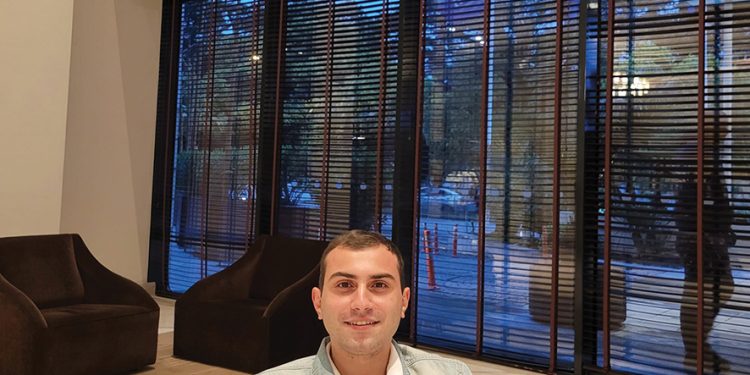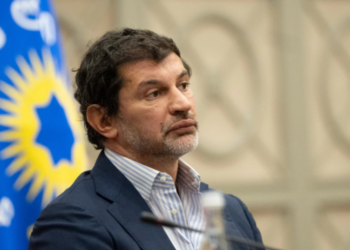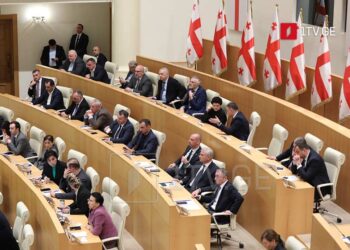A few years ago, writing for this newspaper, a high school student from Kutaisi shared his experiences as a person living with disability in Georgia. That high school student was me, back then getting ready for something many believed was impossible.
Having multiple alternatives is one definition of freedom. More freedom and continuous development have always been my and my family’s goals. This process is constant and continues today. A special period began in the fall of 2017, when I started studying journalism. The university I chose was located in Tbilisi.
Even today, I get the greatest happiness by remembering the emotions I had when it was decided that I should continue my studies in Tbilisi. Every new place for people with disabilities is associated with new challenges. So it was in my case, and there were interesting but very difficult missions to complete. At that time, Tbilisi was the only city with adapted transport. This, for reasons I probably shouldn’t be explaining, was of great importance to me.
Freedom of movement and accessibility are fundamental issues on the path of self-development. It is a great pleasure when you realize your childhood dream and start studying your dream profession. This fact gave me great motivation, I started studying with great enthusiasm, rain, snow and fatigue were all insignificant details I had to overcome.
My first apartment in the Avlabari district of Tbilisi, a studio flat which I shared with my beloved grandma who followed me to the big city to help me anyway she could, was small. So small that sitting in my wheelchair there left barely any room to maneuver. But that wasn’t the biggest problem.
Getting out of the traditional Italian courtyard building required special skills. The path in the yard was made of big stones, making wheeling a challenge; the building lacked a ramp, but my father built one, and there came another challenge: The sidewalk was very narrow, allowing for the construction of only a steep ramp. In practice, that meant that if I weren’t careful, I might go flying down into the busy street where I could easily have been hit by a speeding car. Luckily, that never happened. But there were much more difficult issues to be resolved ahead.
When I came to Tbilisi six years ago, there was very little public transportation available in the city. When I was planning my route, I had to know in detail all the buses that I could get on. The little yellow buses were out of the question; I could only get on a new bus with a ramp. I remember the first time I got into the subway on my own, and the police chased me away in fear. Come to think of it, who wouldn’t be scared to see a guy in a wheelchair who somehow miraculously holds onto the rails with his hands while making sure his wheelchair doesn’t come crushing down the escalator. And then there’s the second I have at the end of the escalator to leave safely, without sliding off my wheelchair. After hearing that story, a friend of mine begged me to promise I would never ever use the subway again.
Transportation challenges aside, I had bills to pay. I was lucky to have received a scholarship from the government to cover my studies at a private university. I was also able to secure financial help for my rent. And yet, as you can imagine, that wasn’t enough to support myself (with what?) and my grandmother. Here begins another interesting episode of my Tbilisi life as a differently-abled student: I got a job!
A friend set up a meeting with two representatives of a company, who, upon hearing my story were interested in finding ways to support me. Maybe pay for an English language class? An internship? Things moved quickly, and almost on the spot I became the company’s junior social media assistant. Miroslav and Lyubomira Ginovi, the Bulgarian-born executives of the Tbilisi-based Georgian Service Network company, expressed great confidence in me, and gave me the opportunity to develop.
I will never forget the chance and the support I was given. In a country where people with disabilities are not seen very often because they don’t have the opportunity to leave their house, Miroslav and Lyubomira made sure I had an office I could go to every day (by taxi, covered by GSN), learn, grow, and contribute. I was very happy when my enthusiasm and hard work were appreciated. Since 2019, I have felt their support every day. I would like to thank them very much and express my sincere respect to them. Their approach and support for an underrepresented community should be an example for all employers in Georgia. Thank you for everything!
It is necessary for companies to give more jobs to young people, especially people with various disabilities. Today, the main problem of disabled people is precisely this, employment in a very competitive environment, which in some cases is added to by an un-adapted environment. Without employment, our freedom is significantly reduced. I would like to call on all companies to try their best to support disabled people in this direction. They will find many qualified personnel who will play a key role in the future. We deserve a chance. I was extremely lucky to have met people willing to help me. A friend of mine, who at the beginning of my journey was based in Tbilisi (he knows what he did, but he will blush if I share his name), helped me with our biggest fear and cost: Renting a small flat in Tbilisi, something my family could have never afforded. He asked his friends for contributions and people whom I never met, from all over the world, made sure I could start my life in Tbilisi. It was through this magical network of well-wishers that I got connected with MAC Georgia, a wonderful organization working tirelessly on supporting people with disabilities in Georgia. For six years, MAC Georgia has been covering six months of my rent, and I can’t describe what a burden that took off our shoulders. Thank you to Jeremy Gaskill and Tornike Goguadze of MAC Georgia, I couldn’t have done it without your generous help.
It took a village. Now, as I’m days away from getting my master’s degree in Public Administration from the East European University, I hope people with disabilities looking to continue their education will be offered a chance to be supported and grow, the way I was.
And yet, people like us shouldn’t rely only on “luck” to be able to study and be part of society. A few years ago, I offered to share my experience with UNICEF Georgia in hopes they could use our voices for their work when talking to decision makers about improving conditions for children with disabilities. I was asked to send a resume and a cover letter, although I wasn’t applying for a job. I only wanted to talk, to make sure we’re being heard as a community this organization is trying to help. Unfortunately, no one ever contacted me from UNICEF Georgia. It is my hope that despite not being consulted, solutions will eventually be put in place.
Meanwhile, I’m looking to combine my interests in journalism and public administration. I hope to find a place for myself in academia, creating training courses that will help both future journalists and public service specialists.
But I’ve already entered a new stage of my life. For starters, I’m paying my own rent myself!
BLOG by Tedo Iobidze














